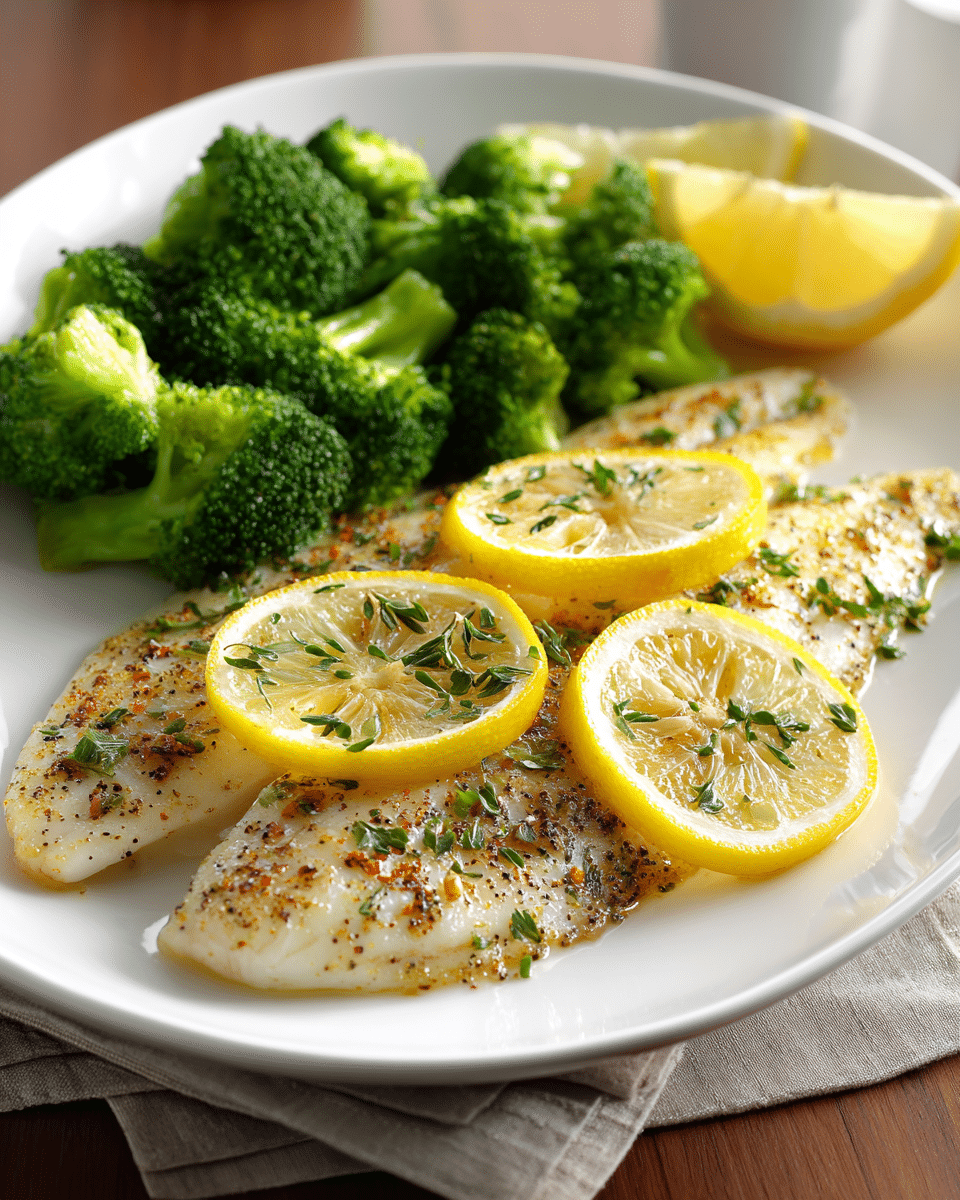This Baked Tilapia with Lemon paired with Steamed Broccoli is a simple yet nourishing dish that’s perfect for a light dinner. It’s quick to prepare, low in calories, and high in lean protein and fiber. The lemon and herbs brighten the fish without overpowering its delicate flavor.
FULL RECIPE
Ingredients
- 4 tilapia fillets (about 4 oz each)
- 1 lemon (sliced and juiced)
- 2 tablespoons olive oil
- 2 garlic cloves, minced
- 1 teaspoon dried parsley (or fresh, chopped)
- 1/2 teaspoon salt
- 1/4 teaspoon black pepper
- 1/4 teaspoon paprika (optional)
- 4 cups broccoli florets
- 1/4 cup water (for steaming)
Directions
- Preheat oven to 400°F (200°C).
- Line a baking sheet with parchment paper and lightly grease with 1 tablespoon olive oil.
- Place the tilapia fillets on the sheet. Drizzle with remaining olive oil, sprinkle with garlic, salt, pepper, parsley, and paprika.
- Squeeze half the lemon over the fish and place a few slices on top of each fillet.
- Bake for 12–15 minutes or until fish flakes easily with a fork.
- While fish is baking, steam the broccoli: add water and broccoli florets to a medium saucepan, cover, and cook over medium heat for 5–7 minutes or until tender.
- Serve tilapia hot with steamed broccoli on the side and a wedge of lemon.
Nutritional Information
- Serving Size: 1 tilapia fillet with 1 cup steamed broccoli
- Calories: 230
- Protein: 28g
- Total Fat: 10g
- Saturated Fat: 1.5g
- Cholesterol: 55mg
- Carbohydrates: 7g
- Dietary Fiber: 3g
- Sugars: 2g
- Sodium: 270mg
- Vitamin C: 90% DV
- Calcium: 6% DV
- Iron: 8% DV
Health Benefits of Baked Tilapia
Baked tilapia is an excellent source of lean protein, essential for muscle repair and overall body function. It is low in calories and saturated fat, making it a heart-healthy option for those seeking to manage weight or cholesterol levels. Tilapia also provides important nutrients such as vitamin B12, selenium, and phosphorus, which contribute to brain health, immune support, and strong bones. Its mild flavor makes it appealing even to picky eaters while delivering significant nutritional value.
Why Baking is a Great Cooking Method for Fish
Baking is a gentle, low-fat cooking technique that preserves the delicate texture and moisture of fish. Unlike frying, baking doesn’t require excess oil, which helps reduce calorie intake and unhealthy fats. It also allows the fish to cook evenly and absorb added flavors from herbs, lemon, or garlic without becoming greasy. Additionally, baking is convenient and requires minimal active preparation time, making it an ideal method for quick weeknight dinners.
The Role of Lemon in Enhancing Flavor
Lemon juice and slices add a bright, fresh acidity that balances the natural richness of the fish. The citrus not only enhances the flavor but also helps tenderize the tilapia during baking. Lemon’s vibrant aroma and subtle tartness elevate the dish, making it more appetizing without adding calories. This simple ingredient is a great way to boost flavor naturally and encourage consumption of healthier meals.
The Nutritional Power of Broccoli
Steamed broccoli is an outstanding vegetable choice packed with vitamins C, K, and A, fiber, and antioxidants. It supports immune function, bone health, and digestion. Steaming broccoli helps retain these nutrients better than boiling. Combined with tilapia, broccoli provides a satisfying, nutrient-dense side that complements the meal with both texture and color, contributing to a balanced plate.
How to Achieve Perfectly Cooked Tilapia
Cooking tilapia just right is key to enjoying its tender, flaky texture. Overcooking can make it dry and tough, while undercooking leaves it raw and unappetizing. Baking at 400°F for 12 to 15 minutes ensures the fillets cook evenly through without losing moisture. The fish should easily flake with a fork when done. Adding lemon slices and herbs during baking helps keep the fillets moist and flavorful.
Tilapia as a Sustainable Seafood Choice
Tilapia is considered one of the more sustainable fish options available. It is typically farmed in controlled environments with lower environmental impact compared to many wild-caught species. Choosing responsibly farmed tilapia supports sustainable fishing practices and helps reduce overfishing in oceans. This makes baked tilapia an eco-friendly meal choice for environmentally conscious consumers.
The Importance of Healthy Fats in This Recipe
The olive oil used in this recipe provides heart-healthy monounsaturated fats, which can help reduce bad cholesterol levels and inflammation. Unlike saturated fats found in butter or animal fats, olive oil supports cardiovascular health and offers antioxidant benefits. Using olive oil in moderation enhances the flavor and texture of the fish and broccoli while contributing to overall nutrient quality.
Meal Prep and Convenience
This baked tilapia with steamed broccoli recipe is simple enough to prepare in under 30 minutes, making it perfect for meal prepping. You can easily batch-cook several portions and store them in the fridge for quick reheating during busy weekdays. Its balanced macros and light nature make it ideal for lunchboxes or a quick dinner, supporting healthy eating habits without sacrificing convenience.
Customizing Flavors and Variations
While the classic lemon and herb seasoning works beautifully, this recipe is versatile enough to adapt to different flavor profiles. You can add spices like paprika, cumin, or chili flakes for a smoky or spicy twist. Fresh herbs like dill, thyme, or cilantro also complement tilapia well. Swapping steamed broccoli for other vegetables like asparagus, green beans, or roasted carrots can keep the meal interesting while maintaining its health benefits.
The Role of Protein and Fiber Balance
Combining tilapia with broccoli creates a balanced meal by providing both protein and dietary fiber. Protein is essential for repairing tissues and building enzymes, while fiber aids digestion and promotes satiety. This pairing helps stabilize blood sugar levels and reduces hunger pangs between meals. Such a balanced plate supports weight management and overall metabolic health.
Tips for Storing and Reheating
To maintain the best texture and flavor, store cooked tilapia and broccoli separately in airtight containers in the refrigerator. Fish is best eaten within 2 to 3 days of cooking. When reheating, use a gentle method such as microwaving on low power or warming in the oven at a low temperature to avoid drying out the fish. Steamed broccoli reheats well but can become softer, so consider lightly sautéing it to refresh texture.
The Appeal of Tilapia to Different Diets
This baked tilapia with lemon and steamed broccoli fits well into various dietary patterns including low-carb, paleo, Mediterranean, and gluten-free diets. It is naturally free of grains and dairy, making it suitable for many food intolerances. Its nutrient density and simplicity align with clean eating principles, encouraging consumption of whole, minimally processed foods.
Conclusion
Baked tilapia with lemon and steamed broccoli is a delicious, nutritious, and versatile meal that supports both health and sustainability. Its simple preparation and balanced nutrients make it ideal for everyday eating, whether as a quick dinner or part of a meal prep plan. By incorporating fresh ingredients like lemon and olive oil, this dish offers bright flavors without excess calories or fat. It caters to a variety of diets and preferences while delivering essential protein, fiber, and vitamins. Overall, it’s a practical choice for anyone looking to enjoy a wholesome, flavorful meal that nourishes the body and respects the environment.






